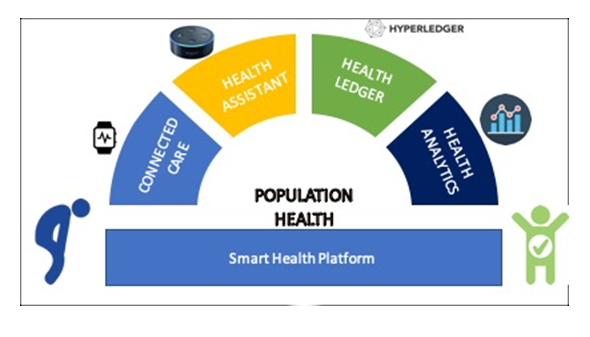The article discusses:
The need to improve patient experience and health outcomes while keeping healthcare affordable, drives the transformation initiatives in the healthcare industry today.
The journey to wellness starts with engaging individuals to play an active role in managing their health as they manage their financials. There has been an increased adoption of wearables like smart watches or fitness bands supported by telehealth and smart pill to improve the care outcomes and adherence. All these innovations enable the patient to self-manage their health from their homes, removing the friction between them, and the caregiver and reducing the visits to the hospitals.
The need for smart health solutions
With the digitization of healthcare, there is a need for smart health solutions that can coordinate the patient journey, integrate the Electronic Health Record and provide the patients a single view of the clinical data at their fingertips(Figure 1 depicts an ideal smarthealth solution).
Tools like conversational apps will enhance the patient experience by removing the anxiety from selecting the providers and by providing details of estimated expense of a procedure. These algorithmic apps will help the patient select the appropriate therapy in the clinical decision support system, improve adherence, and reduce the R&D costs for new drugs.
All the health data collected from the apps can be used for advanced health analytics. The data can be anonymized and voluntarily shared by the individual for research purposes.The individual’s health data canbe stored in a blockchain-based distributed health ledger where the individual owns the data and authorizes sharing some links with their physicians. Health ledger will also ensure that the data is shared only with authorized healthcare providers and the access can be revoked after use. With the rising concerns about data security, security has to be in the DNA of every solution.

Figure 1: Smart health solution leveraging cloud
AWS Cloud healthcare
AWS Cloud acts as an enabler for healthcare transformations by providing agility, immense scalability and a mechanism to link the infrastructure OpEx spend to health outcomes. AWS IaaS and PaaS services accelerate the development of smart health solutions.
In the realm of connected care, AWS IoT solutions help secure, manage, and analyze the data generated by connected care devices. AWS IoT Core securely connects, processes messages, routes them to the business microservices and AWS endpoints. Device Management manages the devices from cradle to grave, which includes setup, software updates, and retirement.
AWS Managed Blockchain solution underpins the Health Ledger solution to manage and maintain the blockchain network. It allows seamless integration into a centralized AWS Quantum Ledger Database, which analyzes the data while maintaining the data provenance. AWS Polly can be used to create a conversational Health Assistant app which can interface with the system of records like member eligibility systems and answer entitlement questions. This speech enabled chat bot can be integrated into the social media channels or even as Alexa skills to answer questions related to side effects of a drug. These assistantshelp in increasing prescription adherence and tracking outcomes.
Data and analytics have been a cornerstone of digital medicine and enable creation of longitudinal health records, perform risk assessments and predict care outcomes based on vitals, prescription adherence and drug efficacies. AWS S3, EMR, Redshift and SageMaker provide a great platform for big data processing and building Machine Learning models on the data. Securing a smart health solution is extremely important as it handles sensitive Protected Health Information (PHI) data. The smart health platform should have an adaptive security framework that can be built using capabilities from AWS like Device Defender, which audits the IoT configurations, AWS Guard Duty, which enables threat detection, and AWS Macie, which detect anomalies in access patterns and take proactive actions like locking down the PHI data vault.
To conclude
The value chains of payer, provider and the pharma industries are intertwined, and the end goal is common ‘value-based care’. Cloud is playing the role of a catalyst in bringing rapid innovation to the connected and coordinated care space and improving quality of care for patients.AWS provides an extensive set of PaaS services that significantly cut down the time to market for smart health solutions.
Industry :

Mohan Udyavar,
Head - Healthcare & Lifesciences Architecture and Cloud practice, Wipro
Mohan has 22 years of IT experience. Currently, he is responsible for providing consulting services to the Healthcare & Lifesciences clients in the areas of digital transformation, cloud adoption, application portfolio rationalization, platform architectures and architecture resilience. He is an AWS Certified Solution Architect Professional.